- Home
- Catherine Jinks
Shepherd Page 4
Shepherd Read online
Page 4
Pedlar.
‘What the hell are ye doin’?’ Rowdy whispers as I drop to my knees beside the back wall. Gyp joins me. I don’t have to say a word; she’s soon scrabbling away at the hole Pedlar dug there last week, while I scoop out the loose dirt that I packed in myself to block his passage.
‘Tom?’ says Rowdy, drawing closer.
‘Quiet.’
Obediently Rowdy lowers his voice. ‘What are ye doin’?’
‘The flock’s out there,’ I hiss back. ‘And bush on the other side of it.’
‘Aye, but—’
‘Help me.’ We don’t have much time. The fire’s taken hold behind us, over near the chimney. There’s smoke pouring in. ‘Dig. Quick.’
Rowdy lays down his carbine and digs. Joe is coughing. He heaves himself off Rowdy’s bed and stumbles towards us, reeling like a drunkard. When he finally reaches the back wall, he has to lean against it to stay upright.
‘But I’ll never fit through that,’ he protests.
‘Shh!’ Rowdy flaps a hand, frantically trying to silence him.
‘This isn’t for you,’ I explain quietly. ‘This is for me.’
4
I USED to catch rats aboard the Lord Lyndoch. There was a plague of ’em, and the desperate crew plucked me from the hold and gave me the run of the ship. That included the galley. I doubt I would have lived else.
Ship’s rats are canny, but no cannier than a fox. The trick to rats is patience—patience and damp sawdust. The crew had been leaving their scent on the traps and wondering why the rats fought shy. I had to explain that the smell of damp sawdust will mask any other.
One day I went down to the bilge, where we often left fresh water to keep the beasts below decks. Sure enough, when they saw my light, a good four dozen rats slipped away into the dark, save for one that was cornered. I had him backed up and glaring until he turned and disappeared, squeezing through a crack no wider than a nail-head.
The hole I’ve just dug makes me feel like that rat.
There are two sheepskins inside the hut. When I toss the smaller one over Gyp’s back, the woolly sides of it drag in the dirt. So I tie the fleece around her belly with tarred twine.
Beside me Joe and Rowdy are quarrelling in furious whispers.
‘Even if there is a man by the fold, he’ll be lookin’ at the roof,’ Rowdy says, his face a mask of sweat. ‘And ’twill be dark, besides…’
‘Dark!’ Joe points at the flames licking along the beams overhead, which are barely visible through a pall of smoke. ‘We’ve a bloody great torch above us, jinglebrain.’
‘Aye, but the sheep’ll give Tom cover,’ Rowdy begins, then erupts into a coughing fit.
Carver’s bound to hear that. He’ll wonder what we’re doing by the back wall.
‘Go!’ I point across the room, trying to smother my own coughs. I’m already wearing the larger sheepskin tied to my waist and shoulders. ‘Don’t start out till you hear me. Wait for my signal.’
‘Aye, if we’ve time enough,’ Rowdy murmurs, glancing uneasily at the roof.
‘Here…’ Joe’s eyeing Gyp. ‘You’re not taking the dog?’
What? Of course I’m taking the dog.
‘We’ll need it,’ Joe growls.
I open my mouth, but Rowdy speaks first. ‘We’ve got the guns, Joe. Tom should take the dog,’ he says softly, then jerks his chin at the door. ‘Come and we’ll move that bed,’ he adds as a whirl of embers fills the air behind him.
Joe grunts. He’s still leaning against the wall, white as salt. ‘Don’t you run off,’ he warns me. ‘You’ll be needing our guns.’
I daresay he’d run off himself, given the chance. That’s why he doesn’t trust me. But I nod and he staggers after Rowdy, who’s already shifting the bed away from the door.
When Joe tries to lift his end, one-handed, the weight is too much for him. He totters and nearly falls. His cough makes me wince; Carver will hear that too.
Rowdy motions for Joe to unbar the door while I fill my pockets with cartridges and tuck my sheathed knife into my waistband. The hilt digs into my belly as I lie down on the dirt floor. In front of me the narrow hole dips beneath the wooden ground-plate before rising again. The sheep are just beyond it; I can hear their weak, wavering cries.
Pray God I’m not trampled.
A spark lands on my hand; it feels like a pin-prick. Gyp whines in my ear. Flat as a snake, wriggling like a worm, I inch forward into the hole, head cocked sideways, cheek pressed into damp earth, ear scraping against wood. Dust shoots up my nostrils, but I can’t sneeze or cough in case Carver hears me. The sheepskin catches on the ground-plate and I grope to free myself. Finally my squirming delivers me, grimy and gasping, into the sheepfold. I’m confronted by a forest of stamping, milling, churning hooves.
A blackened ember flutters down.
The sheep bleat as firelight flickers on their backs. They’re frightened—of me, of the fire, of Gyp most of all. She’s squeezing through the hole behind me now, also wearing a woolly white bonnet and coat.
Joe was right; the roof is as bright as a torch. I can see much more than I’d like to. Raising my head, I catch a glimpse of someone standing just beyond the southern fence. I don’t recognise him. He’s not the potato-face I shot at—the one Carver called Nobby. This is a rangy ferret of a man with a wall eye, a beaky nose and lank, pale hair that hangs to his shoulders. He’s wearing a lacy neckerchief, a white linen shirt, a watered silk waistcoat and a Wellington hat, but he’s no gentleman. His Adam’s apple sticks out like a knee.
He’s carrying a musket.
This must be Cockeye, come to guard the rear of the hut. He’s looking at the roof, not at me, but I’m not taking any chances. I duck down and daren’t lift my head again, for all it’s draped in sheepskin and level with the beasts around me. I can’t risk being spotted.
With my gaze to the ground I start shuffling on my hands and knees straight across the fold towards the western fence, which is close to the bush. There can’t be more than twenty yards of cleared land between one and the other. In front of me, the sheep part like water before a ship’s prow. Behind me, they bray in alarm; I don’t know whether Gyp’s frightened ’em or if they’re scared of the fire. I’m scared of the fire. Embers are drifting down onto our backs. There’s a smell of scorched wool.
‘Carver!’ Cockeye’s shout is thin and squeaky. ‘Do we want roast mutton, or should I let ’em loose?’
From the front of the hut Carvers calls, ‘Wait,’ his voice almost drowned by the clamour of sheep. There’s a scuffle behind me as some of them jerk out of Gyp’s way. I hope they’re not running from her. Surely they’ve not enough room to run?
This fold is a close fit. I was counting on it. I don’t want Cockeye spotting any suspicious breaks in the carpet of sheep’s backs.
‘Dammit,’ says Cockeye. Why? Has he seen me? A sheep’s piercing scream cuts across a chorus of frantic bleats. It might have been Pudding but I can’t check. All I can do is crawl, eyes on the dirt, head tucked down.
‘Carver!’ Cockeye sounds worried. ‘They’re startin’ to burn.’
‘All right,’ Carver yells back. ‘Let ’em loose.’
What’s happening now? Which hurdle will Cockeye open? His footsteps are drowned by the crackling fire, the crying sheep and the pounding of my heart. I need one look. Just one. A quick glance, is all.
And there he is at the sou’western corner of the fold. He’s trying to untie the ropes one-handed. (Good luck to him; any knots of mine will be tight as caulking.) I wish he’d stayed on the southern side, but I’ve a notion this may still work in my favour. If he’s trying to undo my knots, he won’t be watching the sheep.
‘Ach, you bastard!’ he curses. I’m close to the fence, now; should I wait or go? Wait, I think. Cockeye’s much too close to the western side. Perhaps I should head for the northern fence, well away from him. But can I risk the big expanse of open ground over there between fold and forest?
Gyp is sniffing at my ankles. Queenie and Piglet are jostling me. The crackle of the fire is getting louder and louder. I can feel the heat now; sweat’s pouring down my face. The fleece on my back is warming up.
A sudden ripple of movement in the f lock spreads outwards from the sou’western corner. Cockeye shouts and all at once I’m caught up in a stampede. Sheep surge past me. One of ’em jack-knifes away from Gyp, whose teeth snap as she guards my rear. This is it. Cockeye’s opened the hurdle. We have to go.
‘Gorn!’ he yells and fires his musket. The flock reacts as one, flinching and pushing forward, all raised heads and rolling eyes.
‘Cockeye?’ Carver bellows. ‘What’s amiss?’
‘Just moving the sheep out.’
That’s Princess bleating; I know the catch in her voice. Tally treads on my hand. Bodies press against me. Together we’re swept along, heading for the hole in the fence.
Where’s Cockeye?
There he is, edging away from the f low of sheep and moving towards the hut. He’s not looking over here; his gaze is on the roof. I’m close enough to see firelight flicker in his eyes.
Here’s the fence, but the flock is speeding up and I’m not quick enough, not on my hands and knees. I’m falling behind. Gyp is beside me, now. Her fleece is slipping off her head but there’s nothing I can do about that. Lifting my knees, I start to hop along on my haunches like a rabbit, praying Cockeye doesn’t notice. He shouldn’t. All I can see is bounding rumps as sheep spill through the gate and scatter across the clearing. Some have wisps of smoke rising from their backs. Some are heading straight for the bush.
That’s where I want to go. Faster, Tom. I daren’t look back. Twenty yards…ten yards…five…
Gyp darts ahead of me into the scrub. Some of the sheep wheel around when they hit the thick, leafy wall, but I keep going, thorns tearing my fleece, branches clawing my face. Relief surges through me as I reach cover.
Gyp is my fourth dog. I met her when I arrived at Mr Barrett’s. He kept me on the farm for six months before he sent me out to the hut to replace Sam Jenkins. By then I was fast friends with Gyp, so Mr Barrett let her come with me. He thought she might help defend his shepherds from the blacks. He didn’t know that Sam had been killed by Carver.
No one did.
On the farm Gyp was one of six dogs but at the hut the only dog was Pedlar until Gyp arrived. He was a shepherds’ dog, assigned to the hut just as I was, and he’d served many different masters. That made him unbiddable, but all he needed was fondness and a firm hand. Carver would have ruined him if I hadn’t come, so I’m glad I did. Despite everything, I’m glad I did.
Pedlar. He had a heart of gold to match his yellow coat.
He died defending me. I’ll never forget that.
The blazing roof of the hut lights my way. The crackle and roar of the flames helps me too; it drowns the noise I make as I crash through the undergrowth. But I don’t have much time. If the roof collapses, Joe and Rowdy are doomed. They’ll either burn to death or Carver will pick ’em off when they try to escape.
Carver is visible now, because at last I’m facing the northern wall of the hut. He’s stationed by the door with his back to me. Nobby stands opposite, clutching our axe, while Carver nurses the pistol. Blood is streaming down Nobby’s face from a cut on his brow. Either my musket-ball grazed him or he was hit by a flying splinter.
He and Carver are waiting for Rowdy and Joe—and for me, of course, because they don’t know I’m outside, creeping through the bush. But I can’t do a thing yet. I’ll have to keep circling. Both of ’em need to look away from the door, and that won’t happen if I’m over here. The door faces east, so that’s where I should be. On the eastern side of the clearing.
Pray God I reach the right spot before the roof comes down.
I wince at the sound of my own footsteps, even though Carver surely can’t hear me through the snap and sizzle of the fire. Gyp pads along beside me like a ghost, her sheepskin snagging on twigs and rough bark. Every time she jerks free, the sheepskin slips a little more. It unfolds under her belly and drags along behind her like a bridal train.
Something rustles in the bush, moving away from me. A possum? It sounded too big for a possum. God grant it wasn’t a black. That fire could easily have drawn every black within miles.
I pause and peer into the shadows, my heart in my mouth. But the darkness is too dense. I can’t see a thing so I move on as swiftly as I can.
Now I’ve a clear view of the door, and Carver’s profile beside it. The light from above doesn’t flatter him. He must have lost that eye when Joe hit him on the head.
A wandering ewe trots across the clearing. That’s Pickle. I hope she’s not burnt.
Just a little bit further…Here. This is the place. I’m opposite the door. I’m well-screened. I’m not too close. In my singed sheepskin, I could easily be one of those stray sheep.
Suddenly a cloud of orange sparks shoots into the sky as a corner of the roof disintegrates. Carver grins.
It’s time.
When I click my tongue at Gyp, she starts to howl. So do I. We moan and yowl like wild dogs. I learned the trick of it as a lure, months ago. Sometimes a wild dog will come to investigate if you call to him, but if he dodges you the first time, he’ll not come again.
Carver’s head snaps around. Nobby turns to look in the same direction—just as the door slams open and Joe bursts out. Rowdy’s behind him. Joe has the musket. He opens fire at Nobby, who drops like a stone, but Carver is quick. His arm jerks up and he shoots Joe in the chest.
‘No!’
No, no, no. Joe falls with a choked yell, dropping the musket. Rowdy aims at Carver and fires. It’s a flash in the pan. Carver ducks anyway, giving Rowdy a split second to drive the butt of his carbine into Carver’s skull. Carver topples. Rowdy bolts.
He’s heading north. No! This way—over here! I’m on my feet, helpless. Then Cockeye charges around the sou’eastern corner of the hut, his musket raised. He fires at Rowdy, who dodges the ball, running hard, weaving between tree-stumps as he heads for the bush. Carver staggers to his feet and nearly trips over Joe…
Joe’s dead. He’s lying in a pool of blood. His eyes stare. His mouth gapes.
What should I do?
Carver points at Rowdy’s retreating back. He speaks to Cockeye but I can’t hear what he says. Cockeye nods, already biting the tail off a cartridge. As he shakes the powder into his priming pan, he heads after Rowdy, stepping straight over Nobby, his comrade, who’s been shot in the neck.
Nobby’s dead too. Is he? I don’t know. Joe’s dead for sure. But Rowdy’s gone—he’s reached the forest. If he has any sense, he’ll reload and hide in there. An ambush might work. He should wait for Cockeye, shoot him, grab his musket and run.
The roof collapses with a crash and a swirl of sparks. Orange smoke billows into the starry sky. Carver is reloading his pistol. There’s blood on his cheek from the butt of Rowdy’s carbine. He spits the tail of his cartridge onto Joe’s bloody chest. His hands are steady as he shakes powder into the barrel, adds the ball, tamps it down. Then he turns his head and fixes his gaze on me.
But he can’t see me—there’s scrub in the way.
He grins like a dog.
I don’t wait to watch him pick up Joe’s musket. Time to go, Tom. Run, run, run.
The bush is dark and grows darker with every step. My eyes are still adjusting, but Gyp can see. Gyp can smell. She swarms along in front of me, dodging tree trunks. Branches slash at my face. Snatch at my shirt.
I’m making too much noise.
‘I ain’t about to gut you, Tom Clay.’ Carver’s low voice drifts out of the darkness behind me. ‘I think I’ll cut yer throat and hang you like veal.’
Oh God, oh God. My sheepskin’s falling off. Faster, Tom, pick up the pace. Gyp’s way ahead of me and I stub my toe and my breathing’s too loud and Carver’s going to catch me. He’s got two guns. I’m dead.
&nb
sp; Suddenly the ground drops away and I’m rolling, tumbling, bouncing—down a slope, not a cliff—but branches break and stones clatter and I fetch up against a log, striking my head and hissing through clenched teeth because I mustn’t groan. I mustn’t cry. I mustn’t make a sound.
Gyp sniffs at my hand, whimpering. One sharp gesture shuts her up; her eyes gleam in the moonlight. Where am I? In a clearing? Wait—is this a hollow log?
‘Before I cut yer throat, Tom Clay, I’m going to take yer dog,’ Carver calls. He’s coming. He’s close. ‘I’m going to stick a pole through her arse and roast her like a pig on a spit.’
Gyp growls.
‘Ssst!’ This log is our only chance. I’m small and so is Gyp—but she baulks at the mouth of the damp, crumbling hole. ‘Gorn!’ I whisper. She looks at me sideways and slinks in, the sheepskin slithering behind her. She doesn’t like this. There may be a snake inside.
If there is, she’ll have to kill it.
Carver’s smashing through the undergrowth, making so much noise that he probably misses the snap of the leafy branch I break off as I wriggle into the log, feet first. God ha’ mercy, this is tight. Splinters prick. Gyp nudges me. I nudge her back.
The log is overhung with ferns and saplings and bushes that I call blackthorn, for want of a better name. None of the plants in this country seem to have names, except the timber. The little birds are nameless too—I have to name them myself, since no one else can tell me what they are.
Once inside the log, I leave the branch propped against its mouth to shield me. Carver’s footsteps are drawing nearer.
‘I’m going to find you, boy. I won’t stop till I do,’ he warns. He’s close now.
I hold my breath. He’s panting. I can hear the crunch of dry leaves under his feet. Golden light glints on the leaves in front of me, because he has our lantern. He smells sour. Somewhere an owl makes a booming noise.
He kicks the log.
I almost gasp. The light grows brighter and I shut my eyes tight, so they don’t gleam.
Please, Gyp—please, Gyp—please don’t growl.

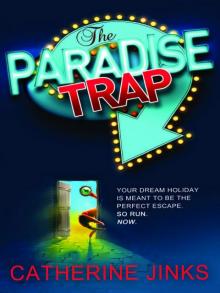 The Paradise Trap
The Paradise Trap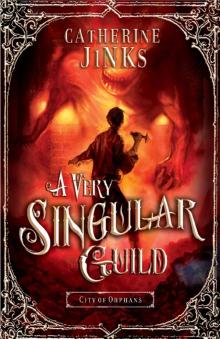 A Very Singular Guild
A Very Singular Guild Eloise
Eloise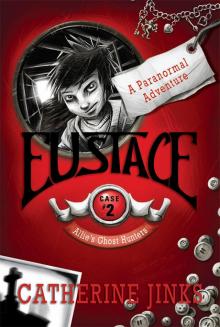 Eustace
Eustace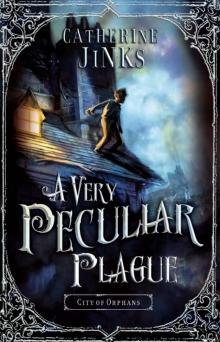 A Very Peculiar Plague
A Very Peculiar Plague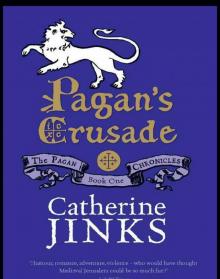 Pagan's Crusade
Pagan's Crusade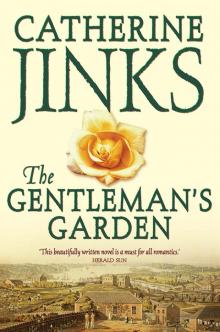 The Gentleman's Garden
The Gentleman's Garden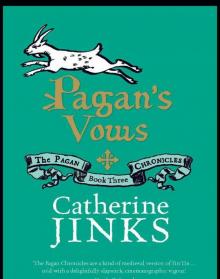 Pagan's Vows
Pagan's Vows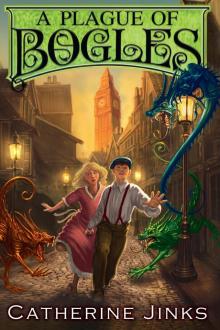 A Plague of Bogles
A Plague of Bogles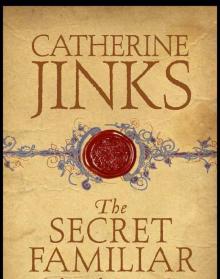 The Secret Familiar
The Secret Familiar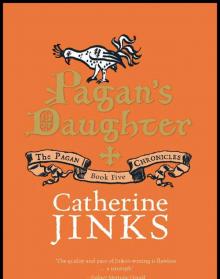 Pagan's Daughter
Pagan's Daughter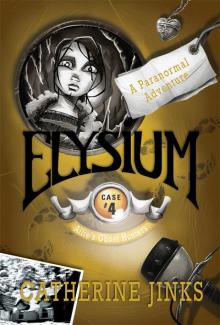 Elysium
Elysium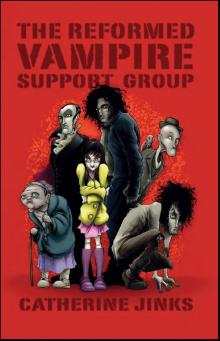 The Reformed Vampire Support Group
The Reformed Vampire Support Group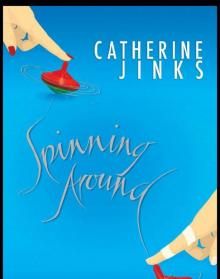 Spinning Around
Spinning Around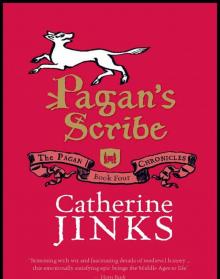 Pagan's Scribe
Pagan's Scribe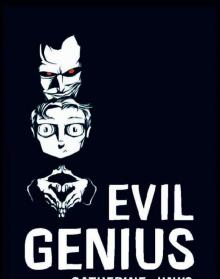 Evil Genius
Evil Genius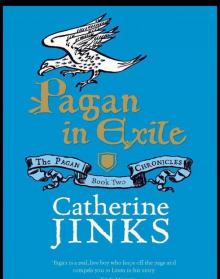 Pagan in Exile
Pagan in Exile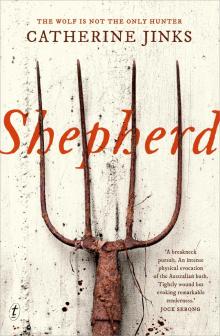 Shepherd
Shepherd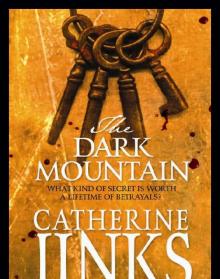 The Dark Mountain
The Dark Mountain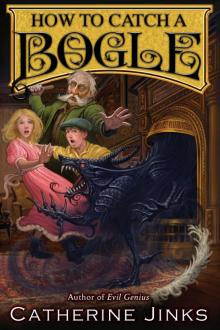 How to Catch a Bogle
How to Catch a Bogle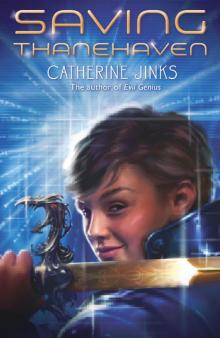 Saving Thanehaven
Saving Thanehaven The Genius Wars
The Genius Wars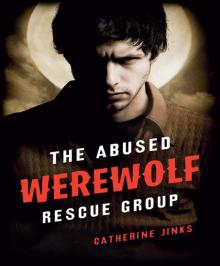 The Abused Werewolf Rescue Group
The Abused Werewolf Rescue Group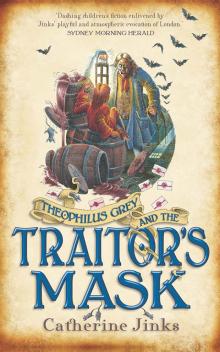 Theophilus Grey and the Traitor's Mask
Theophilus Grey and the Traitor's Mask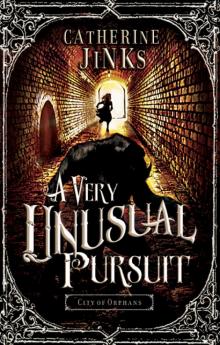 A Very Unusual Pursuit
A Very Unusual Pursuit Genius Squad
Genius Squad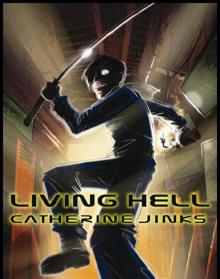 Living Hell
Living Hell The Road
The Road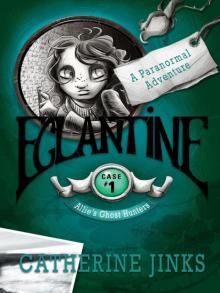 Eglantine
Eglantine